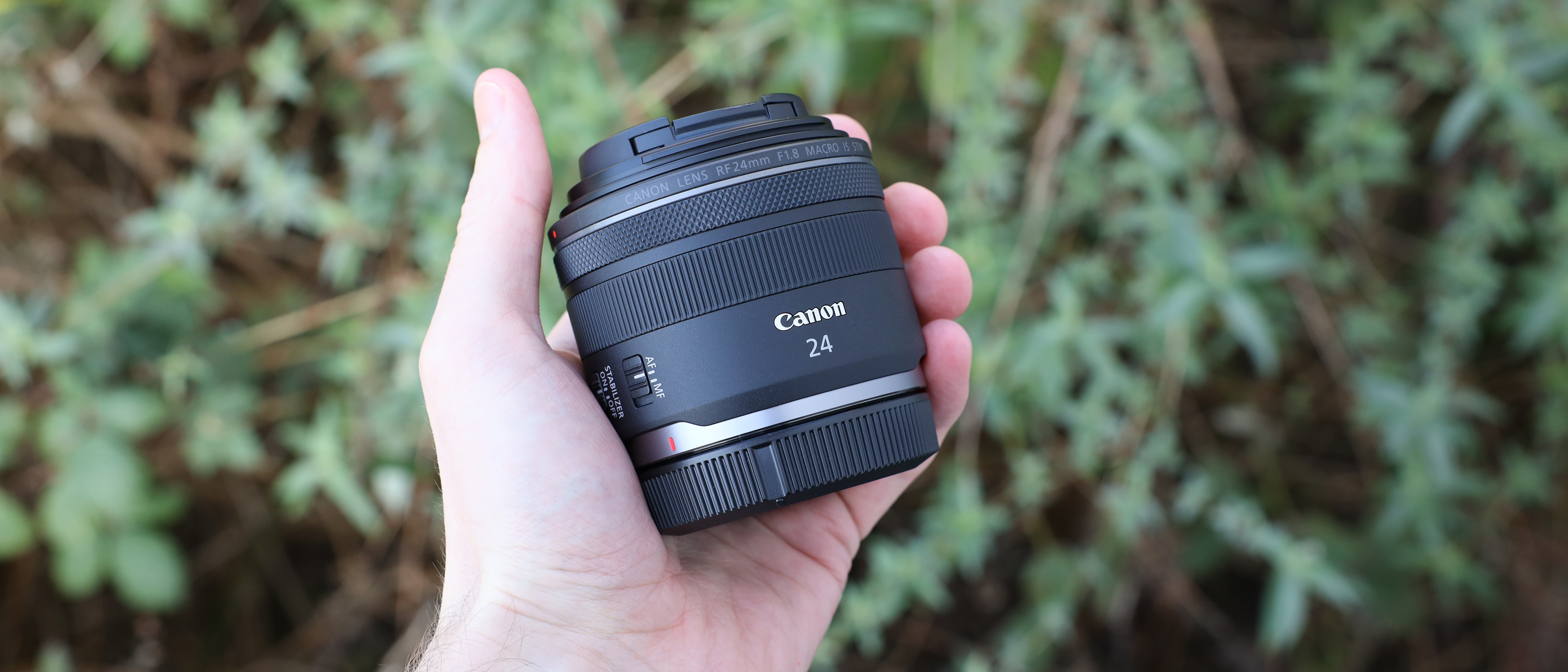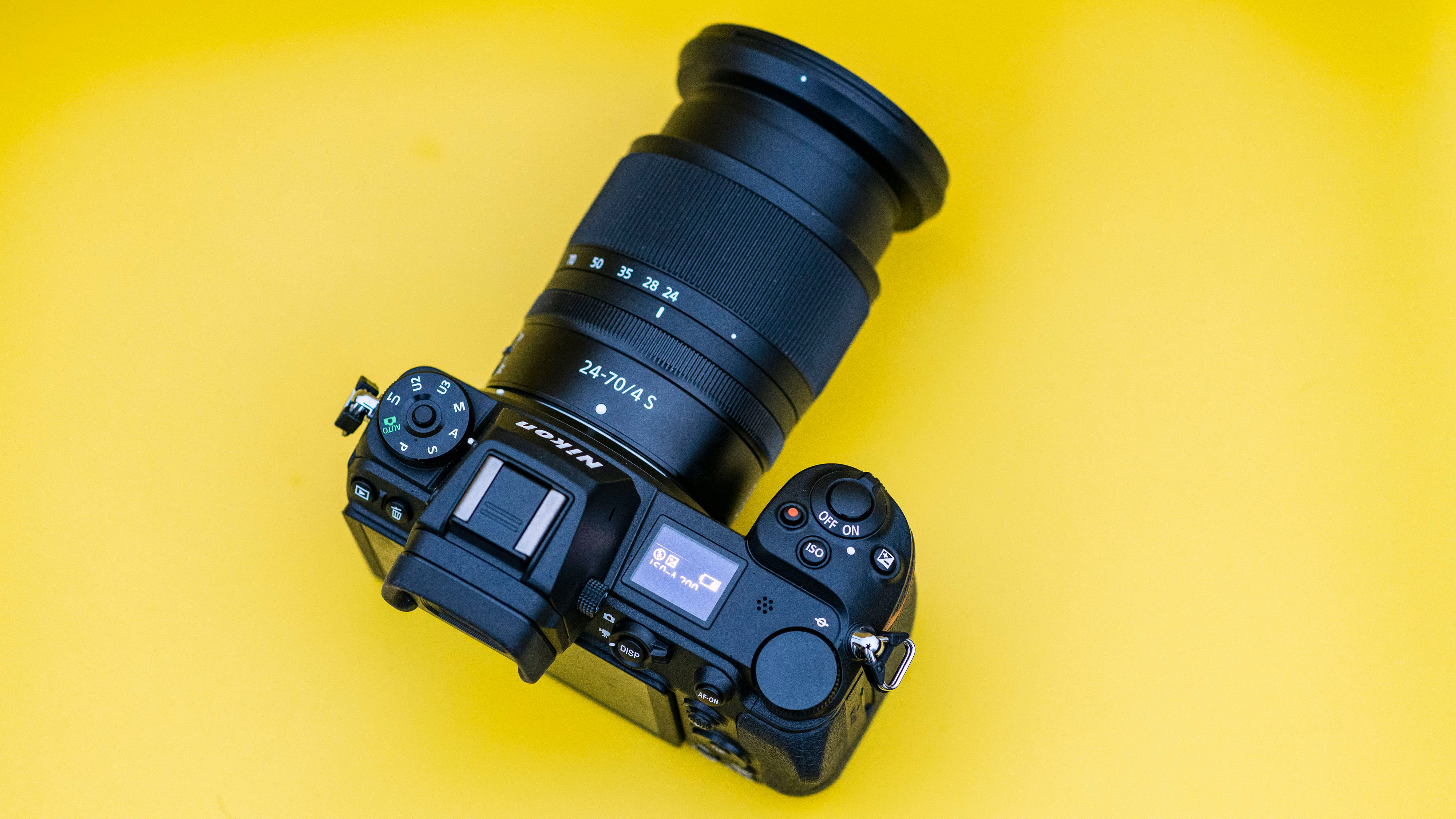Digital Camera World Verdict
Every photographer needs a good wide-angle lens, those who prefer prime lenses will be very happy with this affordable entry from Canon. Compact and light and very easy to throw into a gear bag for a long day of landscape or street photography. Sharp in the center, with a wide aperture for creative depth of field, as well as IS for low-light handheld shots or video making. What's more, the lens' 0.5x macro capabilities are a great added bonus for dabbling in close-up photography.
Pros
- +
Image stabilized
- +
Wide aperture
- +
Light and compact design
- +
Quick and quiet autofocus
- +
Macro capable
Cons
- -
Corner sharpness isn't great
- -
Vignetting can be a problem
- -
Some color fringing
Why you can trust Digital Camera World
Most photographers at one time or another will need the best wide-angle lens, and one of the most popular focal lengths for wide angle is 24mm. Wide enough to take in a whole landscape or street image, but not wide enough that it starts to distort the image into a fish-eye effect.
If you want a lens with a 24mm focal length, you are not short of options, with most cameras coming with an 18-55mm or 24-105mm standard zoom lens option. Then there are also kit lens upgrades usually in the shape of a 24-70mm lens or the option of wide-angle zoom lenses. However, zoom lenses usually come with compromises in their optical quality to cover increased focal distances.
Prime lenses offer the benefits of premium optics, with lens elements designed to perform one task perfectly without having to worry about moving and twisting for different magnifications. Canon has fleshed out its wide prime RF lens selection quite well already, offering an affordable RF 16mm f/2.8 STM and the enthusiast RF 35mm f/1.8 IS Macro STM option for photographers. Canon has now added the RF 24mm f/1.8 IS Macro STM to their ranks.
Specifications
Focal length: 24mm
Max aperture: f/1.8
Minimum aperture: f/22
Diaphragm blades: 9
Autofocus: STM motor
Image stabilizer: 5-stop optical, 6.5-stop with compatible camera body
Lens Construction: 11 elements in 9 groups
Optics: 1x PMo Aspherical , 1x UD
Closest focusing: 0.14m
Max Magnification: 0.5x
Dimensions: 74.4x63.1mm
Weight: 270g
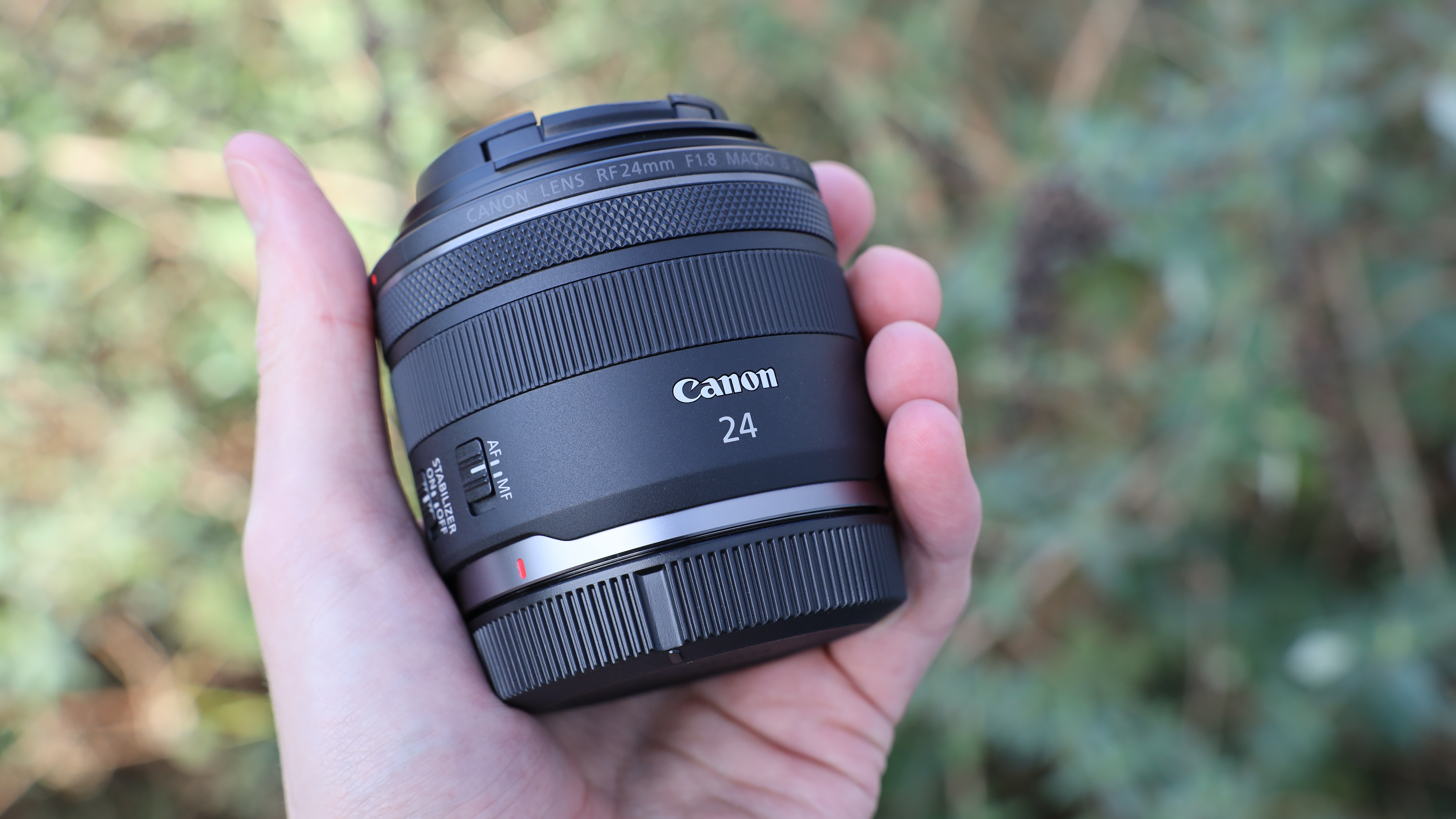
Key features
As mentioned above prime lenses are specially engineered to offer the lowest amounts of distortion in your images, the RF 24mm has one aspherical element in the lens to help flatten out images. As well as this the lens has coatings on the glass to help prevent flares and ghosting.
The fast f/1.8 aperture will allow you to capture subjects with a shallow depth of field, resulting in beautifully blurred backgrounds, and with a 9-blade aperture ring, the background fall off and bokeh effects should be round and smooth.
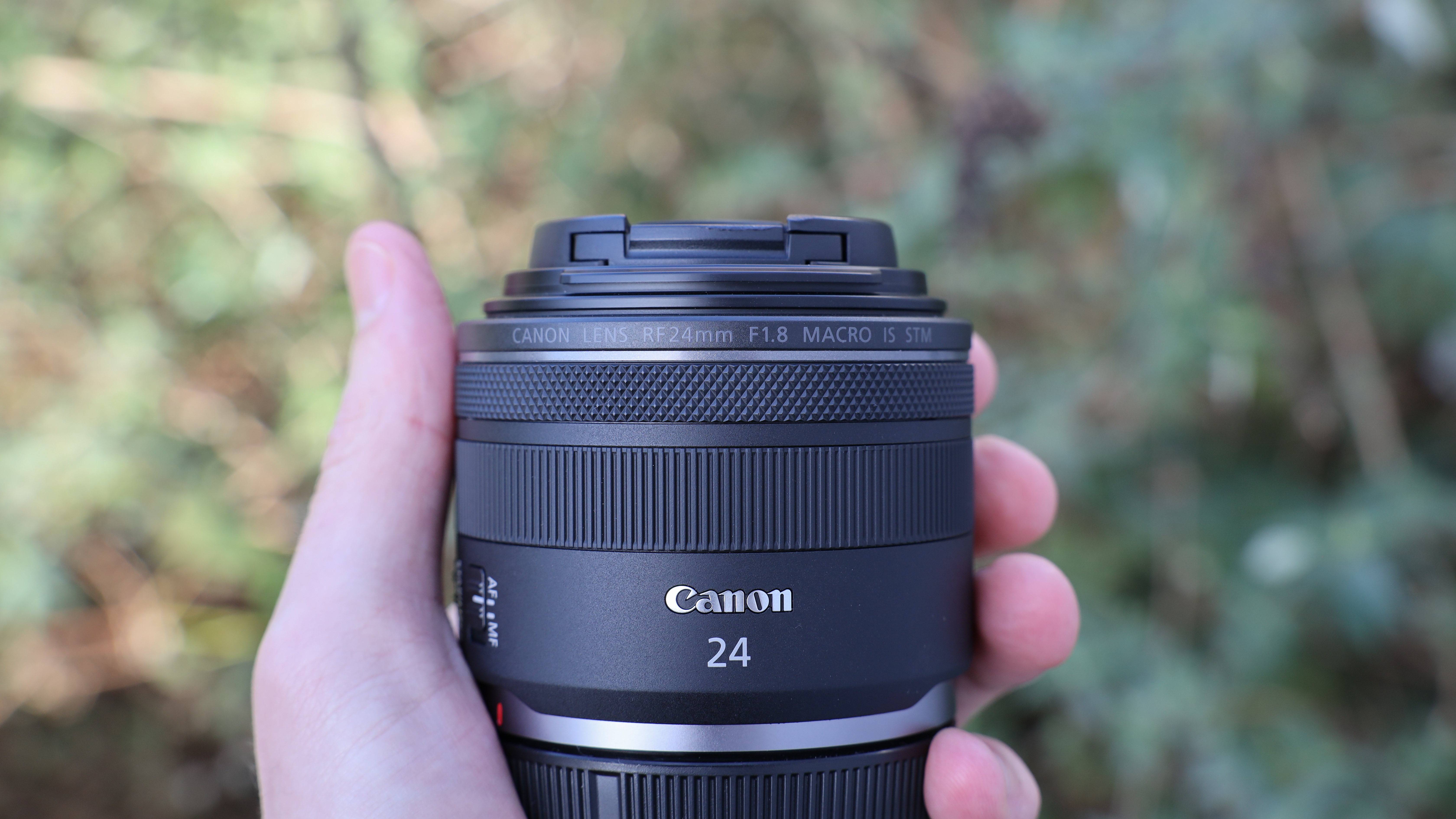
The lens has optical stabilization, with up to 5 stops from the lens itself, and when paired with an EOS R body with in-body image stabilization, this can reach a total of 6.5 stops of combined image stabilization. The RF 24mm also comes equipped with Canon's fast and quiet STM motor.
Small and compact, weighing only 270g, the lens won't take up too much of a gear bag, the lens is not weather sealed, but it does have manual switches for autofocus to manual focus and Canon's control ring.
As the name suggests, the 24mm does have macro capabilities, but not true macro, instead offering a 0.5x magnification, which is a half-life size. 24mm is not the ideal macro focal length, but it is a nice additional bonus
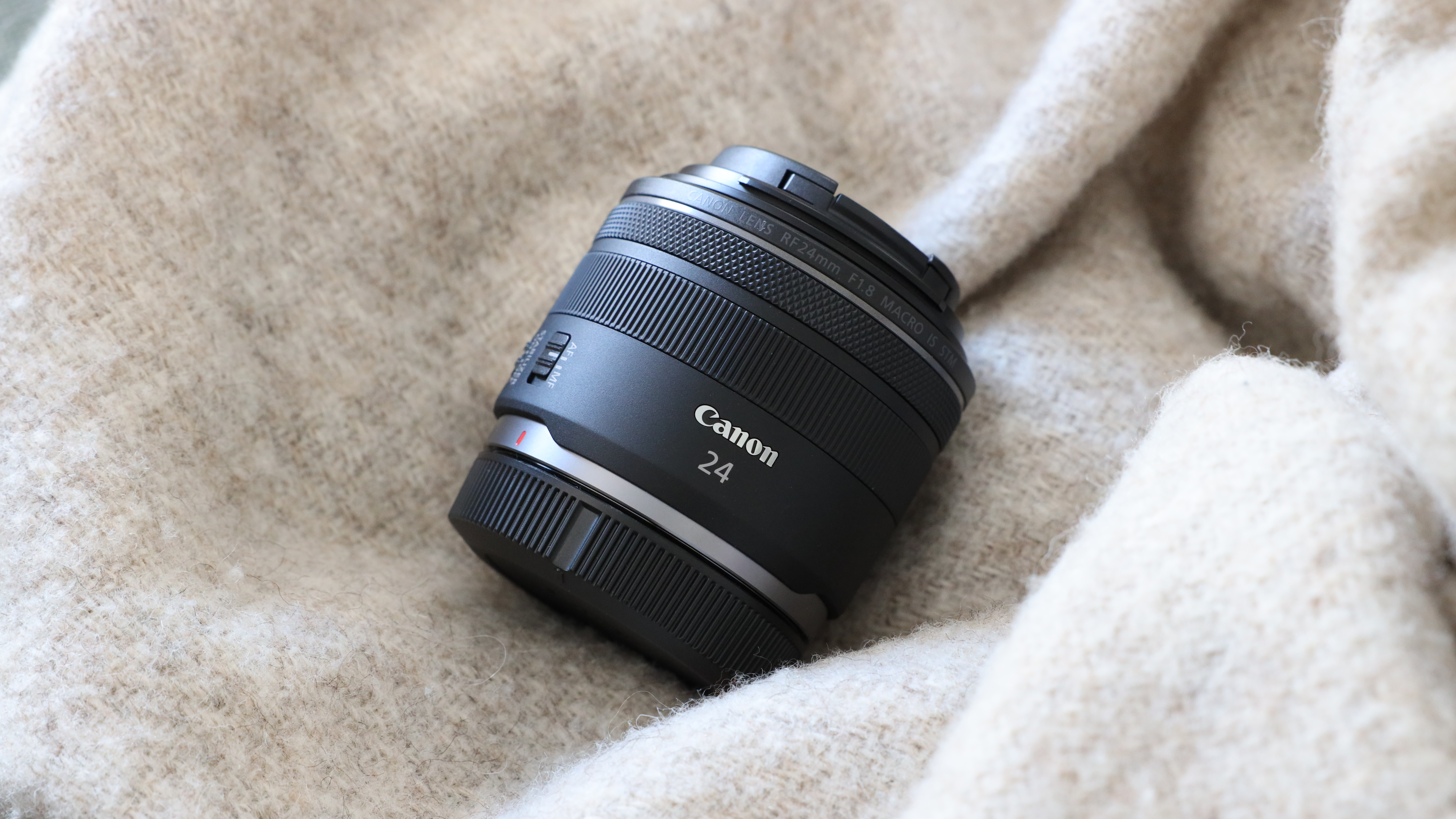
Build and handling
If you have used one of Canon's more affordable range of RF lenses, such as the RF 35mm f/1.8 IS Macro STM or the RF 85mm f/2 IS Macro STM then you will be very familiar with the build of this lens as it is near identical to those lenses.
Canon's design here is slick and smooth, with an overall simple minimalism to the lens design which is great, the lens has a smooth and grippy focus ring and a textured control ring, both of these textures are instantly recognizable, so you won't be getting confused between the two.
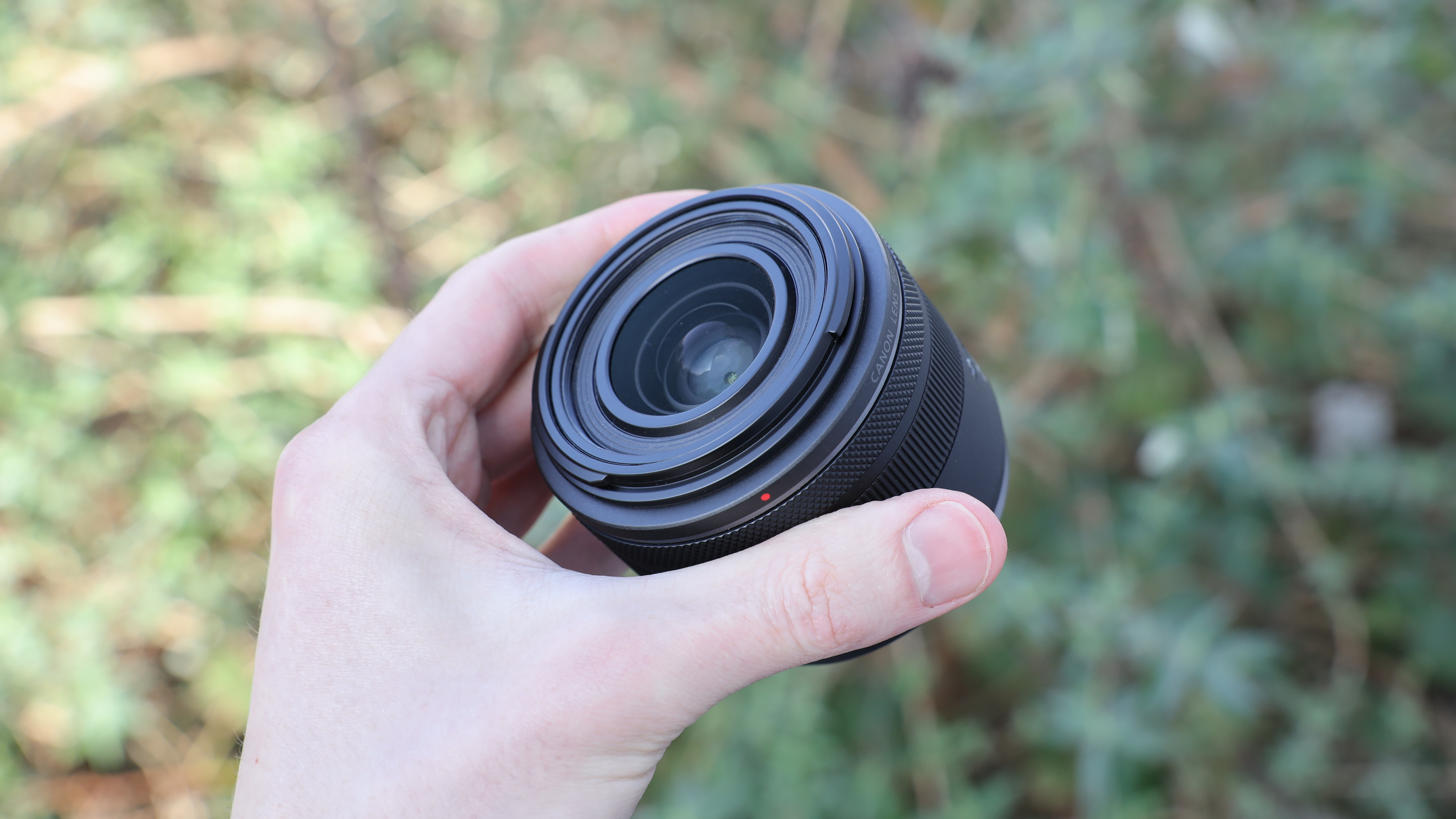
On the lens there are also two switches for AF/MF focus and to turn the IS on and off, these buttons are both easy to switch, but offer plenty of resistance, so that a light brush won't accidentally turn off your image stabilization.
Unfortunately, there is no weather sealing on the lens, which is always a strange omission as doesn't seem obtrusively expensive to add a rubber seal. The lens also doesn't have a fluorine coating on the front, opening it up to smudges.
The lens is so very light and is a joy to carry around all day, if you are a street or travel photographer, this lens with a camera easily fits into a bag or even a large coat pocket, and you won't be troubled once by its weight.
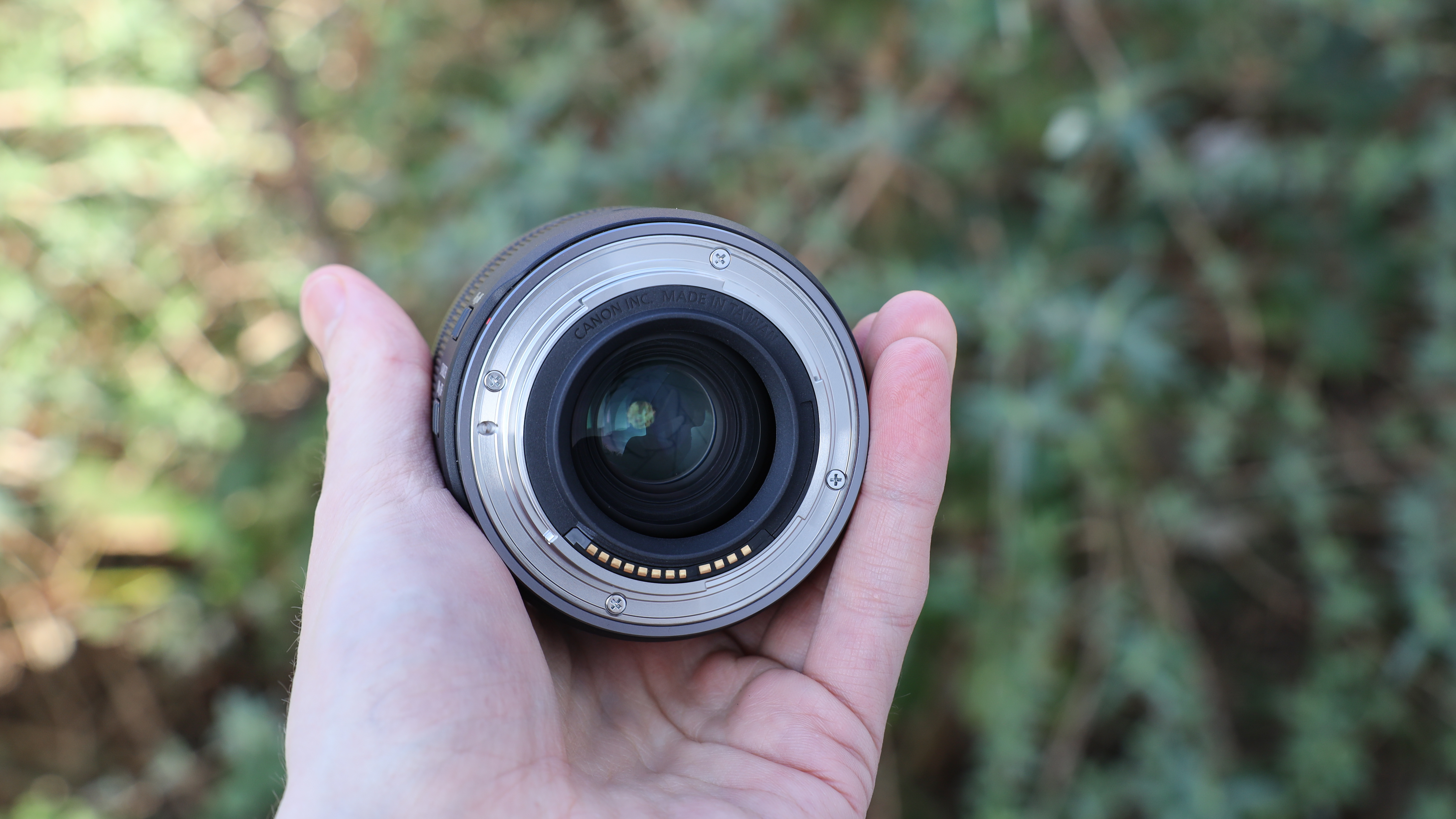
Performance
For such a light and compact lens, the Canon RF 24mm f/1.8 IS STM performs admirably, and anyone who has used the Canon RF 35mm or RF 85mm lenses will be able to seamlessly switch between those lenses and this one.
The autofocus is very fast and accurate, with the STM motor smoothly moving between focal points. Most notably the RF 24mm is very quiet in focusing, this is a welcome change, as the biggest complaint with some of Canon's other RF lenses such as the RF 35mm f1.8 and RF 50mm f/1.8 is they are a bit noisier than is ideal.
When shooting wide open, the Canon 24mm has very good sharpness in the center, although this does fall off heavily in the corners which is a shame, especially for a prime lens. When stopping the lens down this does improve, but not as much as I would have hoped.

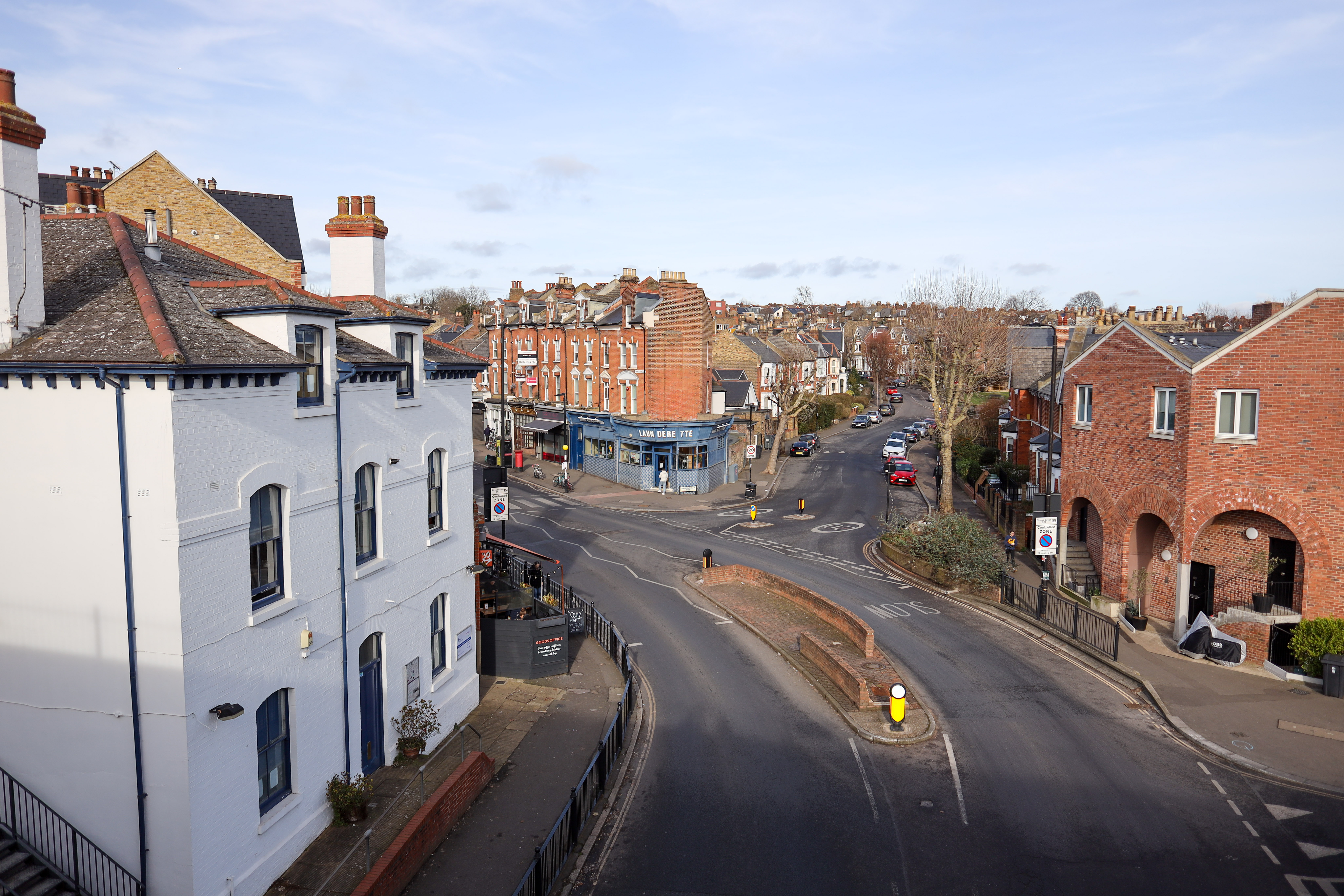
Vignetting wide open is also a big problem, a Canon camera (with updated firmware) can correct vignetting in in-camera JPEGs, but if shooting RAW, this is something that will need to be corrected in editing software. Vignetting does improve very quickly as the lens is stopped down.
Distortion, is minimal but apparent in certain shots, with corners looking quite smudged. I took some sample shots of flat brick walls, usually a good way to see distortion, the in-camera corrected JPEGs were flattened out well with minor relics in the corners, but for RAW images there was a lot that needed to be tweaked in post. However, for a lens of this price and size, it is acceptable.
There is also some uncontrolled color fringing, with purple highlights making their way into high-contrast areas much more than is ideal, with a heavy inference towards the corners of the image. This is quite easily suppressed in editing software, but it is clear to see the difference when Canon does not include its best optical elements.


The lens has 0.5x macro capabilities, 24mm is not a 'normal' macro length of usually around 90mm, this means it has a slightly unusual field of vision, which makes for an interesting and more unique perspective. The macro shots though are incredibly sharp in the center, picking up a lot of tiny details. In the sample images below, you can see it has picked up dust around the bird's eye and the unevenness of the paint.


Lab Results
We run a range of lab tests under controlled conditions, using the Imatest Master testing suite. Photos of test charts are taken across the range of apertures and zooms (where available), then analyzed for sharpness, distortion and chromatic aberrations.
We use Imatest SFR (spatial frequency response) charts and analysis software to plot lens resolution at the center of the image frame, corners and mid-point distances, across the range of aperture settings and, with zoom lenses, at four different focal lengths. The tests also measure distortion and color fringing (chromatic aberration).
Sharpness:

Center and mid-frame sharpness are good when shooting wide open, but you'll need to stop down to f/2.8 to get the best out of the lens, and even then sharpness isn't quite on par with some other RF primes we've tested. Corner sharpness is mediocre wide open, but quickly becomes very respectable and by f/4 sharpness is impressively consistent across the entire image frame.
Fringing:
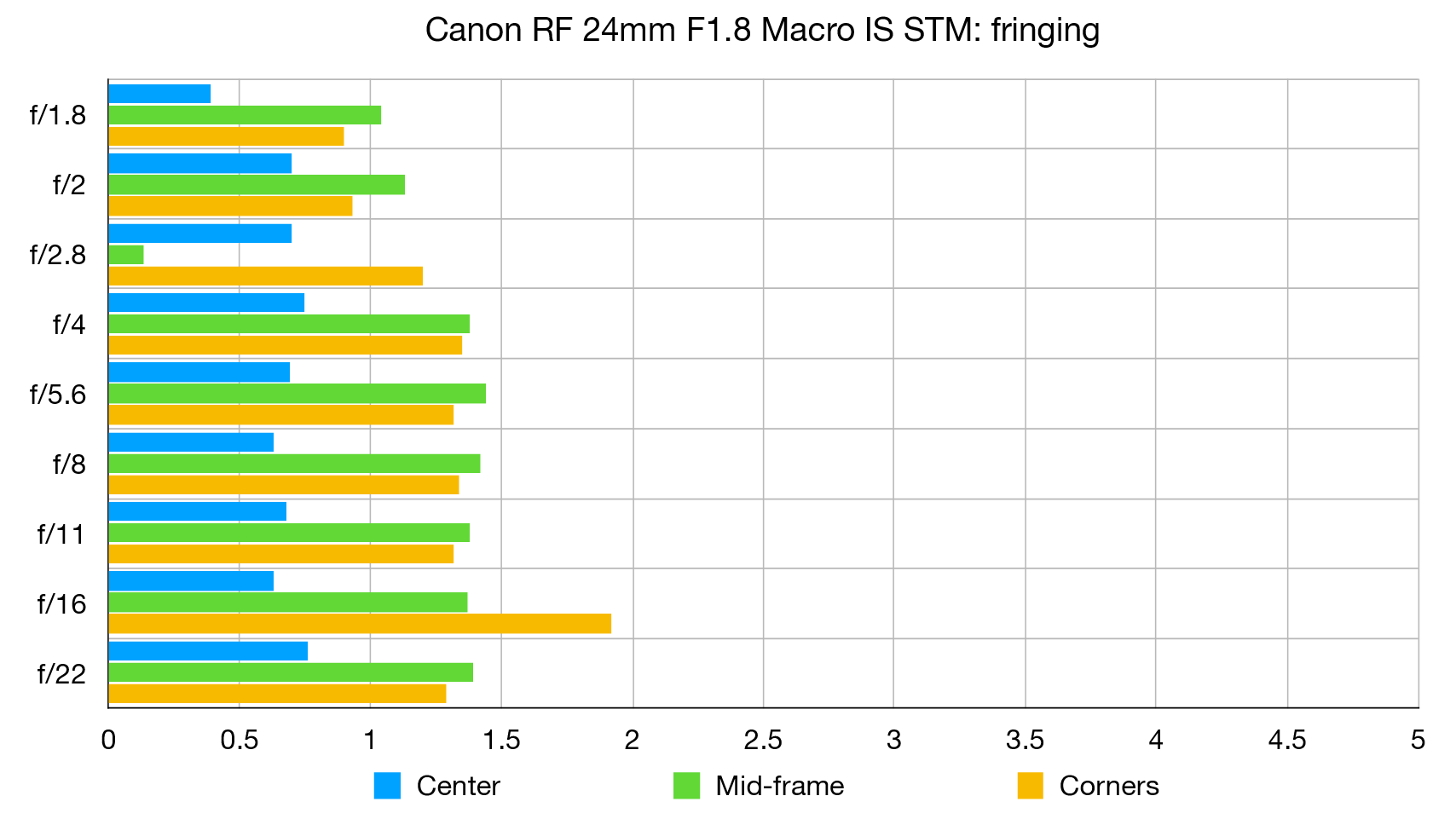
Lateral chromatic aberration is apparent in the corners of images at all apertures, though only just, and it never becomes distracting.
Distortion: -6.93
Disabling distortion correction in RAW processing reveals very heavy barrel distortion - a common theme among recent wide-angle RF lenses. One would suspect that if the lens was engineered to produce less distortion optically, it would need to be compromised in other ways, hence software distortion correction is heavily relied upon to counteract the significant barrel distortion.
Verdict
There is a lot to love about the Canon RF 24mm f/1.8 IS STM, it is very light and compact, which is perfect for a prime lens photographer who might have several different lenses in their kit bag. It is easy to carry around all day for landscape or street photography without noticing any added bulk.
The lens is packed with features from image stabilization for low-light photography and steady videos, to a wide aperture of f/1.8 that will enable a wider and more creative depth of field. The lens also has 0.5x macro capabilities are a great added bonus for dabbling in close-up photography.
The RF 24mm is weak with corner sharpness and vignetting when wide open, and also suffers from some quite strong color fringing, which does let it down, however, the glass is half full, and these are easily fixed with modern photo editing software.
You can find out more about the best Canon lenses in our guides, as well as the best Canon RF lenses, the best Canon wide-angle zooms, and the best lenses for street photography.

Gareth is a photographer based in London, working as a freelance photographer and videographer for the past several years, having the privilege to shoot for some household names. With work focusing on fashion, portrait and lifestyle content creation, he has developed a range of skills covering everything from editorial shoots to social media videos. Outside of work, he has a personal passion for travel and nature photography, with a devotion to sustainability and environmental causes.
